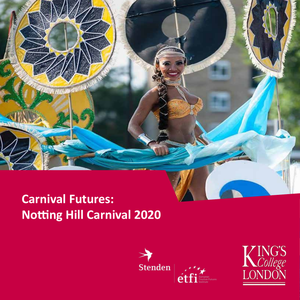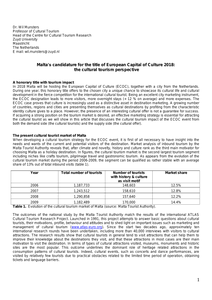Cultural festivals can attract cultural tourists, extend the tourist season and add vibrancy to the cultural scene. However, there is relatively little research on how festivals affect tourist experience of the destination or outcomes such as satisfaction or repeat visitation. This study used the Event Experience Scale to measure tourist experiences at three cultural festivals in Hong Kong – the Lantern Festival, Dragon Boat Festival and the Cheung Chau Bun Festival. The findings show that tourist experiences of these festivals are distinct, and they positively affect destination image and behavioural outcomes. Relative to permanent attractions and tours, festival experiences elicit stronger affective, conative and novelty responses. Festivals also convey a stronger impression of Hong Kong as a destination exhibiting Chinese and traditional culture, but less as a global city. The festival experience is associated with positive outcomes, namely greater satisfaction, intention to recommend and intention to return.
DOCUMENT

This paper attempts to extend the analysis of event effects by analysing the knowledge creation role of an Italian literary festival, the Festivaletteratura in Mantua. The festival uses its local network, consisting of cultural organisations, local firms, festival volunteers and civic organisations to develop and disseminate knowledge. This is linked to an (inter)national network of creative actors, including creative entrepreneurs and festival (ex) volunteers who help to focus attention on the event. The combination of the locally embedded network and an extensive international network are key to the development of the festival as a knowledge hub. In the analysis of such knowledge-based festivals, it is important to shift our focus from events as a happening at a specific moment in time, to their more permanent role as a creative hub embedded in a regional context.
LINK
In the past two years [2010-2012] we have done research on the visitor experience of music festivals. We conducted several surveys asking festival visitors for demographic variables, taste in music, their motivation for visiting festivals, mentalities and the evaluation of the festival. We also asked for the use of social media before, after and during the festival. Results show that visitors using social media have a significantly different festival experience from users that do not use social media before, during or after the festival. Results on difference in festival satisfaction are mixed.
DOCUMENT
Festivals are nowadays a cultural, social, and economic force to be reckoned with. This study will offer an overview of the Dutch festival landscape, which has been lacking. There are commercial initiatives that target only a portion of the festival sector, and there are specific branch organisations or cultural funds that only cover the data of their members, for instance the Netherlands Film Fund reports on ten major Dutch film festivals in their annual Film Facts & Figures of the Netherlands. National institutes such as Statistics Netherlands (CBS) and The Netherlands Institute for Social Research (SCP) also lack substantial data on Dutch festivals.
DOCUMENT

This paper provides an introduction to the special issue of the Journal of Policy Research in Tourism, Leisure and Events on Festival Cities and Tourism. It provides a contextualisation of the conversations surrounding the relationship between cities and their festivals during the Covid-19 pandemic. Focussing on the ‘festival city’ of Edinburgh, we examine how festival organisers reacted to the challenges of the pandemic, and how they strove to maintain contact with audiences and other stakeholders. We then review the different contributions to the special issue, ranging from festivalisation and suburban food festivals in Barcelona to an art festival in Dublin, the European Capital of Culture in Hungary and the festival portfolio of Hong Kong.
MULTIFILE
Carnival Futures: Notting Hill Carnival 2020 is a King’s Cultural Institute project led by Nicole Ferdinand (Culture, Media and Creative Industries at King’s College London) which sought to engage cultural organisations and other stakeholders in planning for the future of the Notting Hill Carnival. The content of this report is intended as a contribution to current research and to identifying future directions for the development of the Notting Hill Carnival. The material and views expressed are produced by various stakeholders in a series of workshops.
DOCUMENT

Coastal and marine cultural heritage (CMCH) is at risk due to its location and its often indefinable value. As these risks are likely to intensify in the future, there is an urgent need to build CMCH resilience. We argue that the current CMCH risk management paradigm narrowly focuses on the present and preservation. This tends to exclude debates about the contested nature of resilience and how it may be achieved beyond a strict preservationist approach. There is a need, therefore, to progress a broader and more dynamic framing of CMCH management that recognises the shift away from strict preservationist approaches and incorporates the complexity of heritage’s socio-political contexts. Drawing on critical cultural heritage literature, we reconceptualise CMCH management by rethinking the temporality of cultural heritage. We argue that cultural heritage may exist in four socio-temporal manifestations (extant, lost, dormant, and potential) and that CMCH management consists of three broad socio-political steering processes (continuity, discontinuity, and transformation). Our reconceptualisation of CMCH management is a first step in countering the presentness trap in CMCH management. It provides a useful conceptual framing through which to understand processes beyond the preservationist approach and raises questions about the contingent and contested nature of CMCH, ethical questions around loss and transformation, and the democratisation of cultural heritage management.
DOCUMENT

DOCUMENT

De kandidatuur van Malta als Europese Culturele hoofdstad in cultuurtoeristisch perspectief
DOCUMENT

The online presence of organizations is long gone from being just a web page. Social media have enabled easy and inexpensive interaction between millions of individuals and communities. This has not gone unnoticed by cultural heritage institutes. The question is what all these social media activities bring. Even if an institute knows what it tries to achieve online, the metrics often consist of confusing accumulation of statistics, across several systems and reveal little about online user behaviour, engagement and satisfaction. In the research project Museum Compass a prototype of a social media monitor is developed, which will contain data of current and historic online activities on Facebook, Twitter, YouTube, Foursquare and Flickr of all registered Dutch museums. The first version of this monitor has been developed, and we believe that this is a good moment to discuss – mostly in a practical sense – our general approach and preliminary results.
DOCUMENT
